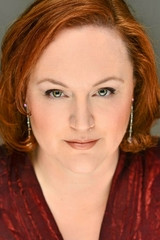|
Back
Micro-Management, Atomic Bombast New York
Isaac Stern Auditorium, Carnegie Hall
12/10/2014 -
Ralph Vaughan Williams: Symphony No. 6
György Ligeti: Requiem
Alfred Schnittke: Nagasaki (United States Premiere)
Sara Murphy (Mezzo-soprano), Jennifer Zetlan (Soprano)
Bard Festival Chorale, James Bagwell (Director), American Symphony Orchestra, Leon Botstein (Conductor)

J. Zetlan (© J&J Photography)
Whatever Leon Botstein’s conductorial qualities, his understanding of music within history is unparalleled. His American Symphony Orchestra programs vary, yet one can read his pre-concert essays with the utmost pleasure. They are scholarly without being academic, he can amass the most disparate information, yet he manages to bind them together with the works he conducts.
Never would Mr. Botstein assume that his theories are the be-all and end-all. Yet he always understands that music is never ever written in a vacuum: the body of genius is singular, but the vestments change dramaticvally with each dramatic era.
Certainly with “Requiem for the 20th Century”, last night, his essay on the aftermath of the Second World War, with its visions of horror, disillusionment and fear, he had a huge choice of examples. He could have done the Penderecki Hiroshima Threnody or a Shostakovich symphony or even a rare work by Weinberg. His choices here, though were, like the essay (which, with the others, I keep) fascinating and challenging.
Ironically, the most difficult piece for success was the most conservative, Ralph Vaughan Williams Sixth Symphony with its mottos of war alarms, its (not very comfortable) attempt at jazz, for a jazz band which had been destroyed) and with its 30-odd minutes of utmost tension.
It was that extreme tension from the very first notes that even the best conductors might dread. Barbirolli and Previn, with their British orchestras, play it straight, and somehow the lines are drawn taut underneath the orchestral playing. Even the galumphing second theme loses its joviality, becoming the harbinger of bad news.
Mr. Botstein produced all the nuances, he never departed from the Vaughan Williams score, but at times, the Symphony proved tedious. Nowhere was this as noticeable at the enigmatic last movement. No melodies, no drum tattoos, none of Vaughan Williams’ lyric strength. Instead, these were bits and pieces, a phrase here, a few notes there, as if the composer was asking the questions, knowing there were no answers.
Mr. Botstein conducted as if...as if these were bits and pieces. Nobody can describe how to conduct “metaphysically”, but that is the answer here. And while the work as a whole had its impact on the audience, one wished for more that a good piece o’ work.
After this was the most familiar work of the evening (though few knew its original name). György Ligeti’s 1965 Requiem, a masterpiece of his “micro-tonality”, of contrapuntal nuances, of 27 separate voice parts, a work that was inspired by the most ancient music.
Which may be why Stanley Kubrick chose it for his futuristic 2001: A Space Odyssey. (The meager payment to Ligeti was scandalous, but the young composer did admit to enjoying his anonymous fame.)
Mr. Botstein presented us with the Bard Festival Chorale, under the directorship of James Bagwell. Not students from Bard, but some of New York’s finest singers under the name of the college. And they did as pheromonal a job as possible under the circumstances.
Equally brilliant–without any reservations whatsoever–were Mezzo-soprano Sarah Murphy and Soprano Jennifer Zetlan. Their challenge was to make the huge octave-and-a-half leaps, to sing in minor-seconds with each other (perhaps even microtones!), to keep not only perfect pitch but to allow each note to have its own change colors and vibratos.
All within the musical framework of textural chorus (nobody could expect these individual lines to show) and orchestra. These two not only had the most unquestionably spectacular moments, but I couldn’t help thinking of Ms. Zetlan as the cute gaminesque role of Mozart in the opera The Classical Style.
The problem with Requiem was the setting. The first time I heard the Kyrie on record, I was sitting in a dark room and was ready to dive out the window, so frightening was the music. Here, in the brightly lit Carnegie Hall, one heard the skin instead of listening to the skull.
Perhaps Mr. Botstein could take the lesson of Georg Friederich Haas, turn off all the lights so we could sit in the appropriate total darkness. Though perhaps some Inquistatorial figures in black could hold some flambeaux in front of the musicians.

S. Murphy (© Joshua South Photography)
The last half was an American premiere of Alfred Schnittke’s very first public work, Nagasaki. To graduate from the Moscow Conservatory, Schnittke was ordered to write music for a Soviet poem about the bombing of the Japanese city, to which he added some Japanese poetry, and an addition by himself which the authorities deemed “subversive.”
That aside, Mr. Botstein chose a work of utmost historical interest. In one way, it was totally derivative. In another, it showed the originality which Schnittke would show in a long highly fertile career.
The derivations were from the very best. A long orchestral interlude about the bombing incident was taken almost directly from the “Ice-Battle” scene of Prokofiev’s Alexander Nevsky, and the finale, with its long long drawn out major chord also was a Nevsky adaptation.
The Shostakovich addition was equally dominant, not from the composer’s better works, but from the wonderfully kitschy Song of the Forests. (That was not written in honor of trees, but in honor of Stalin’s reforestation project.)
The Japanese poetry was vaguely pentatonic, had plenty of Japanese-style woodblock percussions, but not even the young Schnittke was an obvious artificial stylist, and those shortened melodies were broadened out.
Derivative or not, Schnittke was then a master of orchestration, and he had a huge orchestra to work with. Nor did he stint on the sounds. When necessary–about half of the 30-minute work, the full American Symphony Orchestra made the Carnegie Hall rafters resonate, the chandeliers possibly shaking.
A lesser soul than myself would call that part of Nagasaki “An Atomic Bombast”, but I would never stoop to that level.
The most original passage was sung by Mezzo Sarah Murphy, not with the great octave leaps of the preceding Requiem, but with a severe austere melody. At first, it sounded like Prokofiev’s haunting mezzo aria from Nevsky with the singer walking through the dead frozen bodies. But then Schnittke added some amazing originality. In this case, it was a musical saw, which sounded initially like a theremin, but then blended in not only with Ms. Murphy, but with a cascading of bells from vibraphone and xylophone.
I had lost my place in the libretto (the Russian and Japanese words were never quite clear from the Bard Chorale), yet that was irrelevant. Ms. Murphy’s unlabored, moving lines with the other-worldly sounds of percussion were memorable enough.
As appropriate for this extrovert student work, Mr. Botstein conducted the music to its extreme, and the excitement roused the audience to an equal extreme of elation.
Harry Rolnick
|